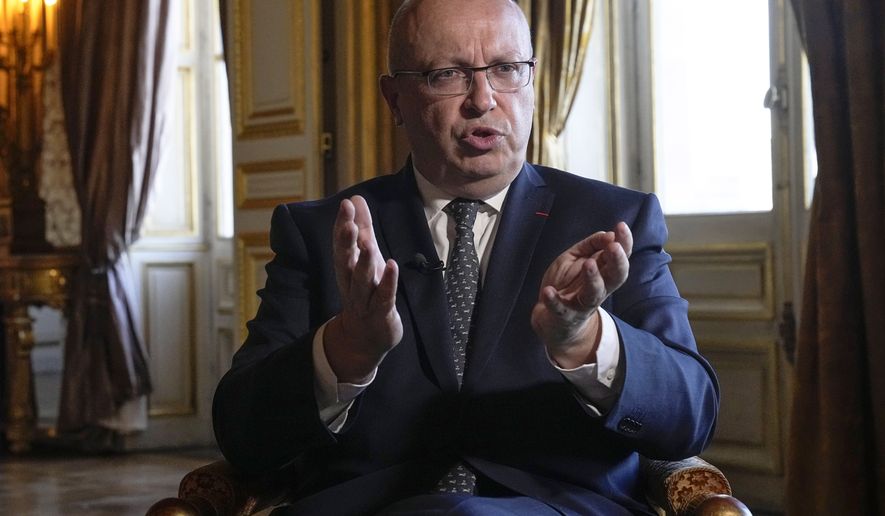PARIS (AP) — France’s ambassador to Australia says Australian officials lied to his face and raised the risk of confrontation in Asia by crafting a secret submarine deal with the United States and Britain that undermined trust in democratic alliances.
France is determined to protect its interests in the Indo-Pacific region, and to put “muscle” into Europe’s geopolitical strategy toward an increasingly assertive China, Ambassador Jean-Pierre Thebault said Friday. He spoke in an interview with The Associated Press before heading back to his post in Canberra.
“The way you treat your allies does resonate in the region,” Thebault said in a gilded chamber inside the French Foreign Ministry, located on the banks of the Seine River in Paris. “The logic of confrontation is not a good one for the peace and stability of the region. We think that we should act otherwise.”
The French government recalled Thebault to Paris last month along with the French ambassador to the U.S. The unprecedented diplomatic move reflected the depth of France’s anger at an agreement for Australia to obtain a fleet of eight nuclear-powered submarines built with U.S. technology.
The Indo-Pacific deal, concealed from French officials, scuppered a previous $66 billion contract for Australia to buy 12 conventional diesel-electric submarines from a French manufacturer.
Apart from the ruptured contract, France thinks the deal trampled longstanding alliances, and its interests in the Pacific – where it has 2 million citizens in French territories and 7,000 military troops – were ignored.
“I don’t understand how it was possible to commit such a lie. I don’t understand how people, several of whom I know, were capable of lying to me…face to face for 18 months,” Thebault said of the Australian officials he worked with.
The ambassador noted that France makes nuclear-powered submarines, and he said Australia refused them when their deal was first struck in 2016, opting for diesel-powered versions instead.
“You could at least have…had a frank and honest conversation, which never happened,” he said.
“Rebuffing a country like France is almost sending a message that there are trusted partners and other partners, which is worrying in a region which needs…partnership and not antagonism,” Thebault said.
So France is turning to other “trusted partners in the region,” he said – naming India, Japan, Korea, New Zealand.
Strengthening the European Union’s Indo-Pacific strategy will be a priority for France as it takes over the EU’s rotating presidency on Jan. 1, he said.
“The rise of China…is an issue that needs to be addressed,” along with climate change and its impacts on Pacific islands, Thebault said. He stressed the importance of “international rules, respect for human rights, the respect for freedom of navigation, respect for sovereignty of countries.”
France last month returned its ambassador to the U.S., a NATO partner. French President Emmanuel Macron and U.S. Secretary of State Antony Blinken met in Paris this week, and Blinken told French TV that “we could and we should have communicated better.” President Joe Biden’s national security adviser, Jake Sullivan, met his French counterpart this week.
But Thebault has remained in Paris.
On Wednesday, French Foreign Minister Jean-Yves Le Drian told a parliamentary committee that the ambassador would return to Australia to help “redefine the terms” of the bilateral relationship and defend French interests in winding up the contract. Thebault is expected to leave for Canberra next week.
Australian Prime Minister Scott Morrison welcomed the decision, saying the bilateral relationship was bigger than the canceled submarine contract. But Thebault suggested there is still work to do before the relationship returns to normal.
Morrison said Macron wouldn’t take his calls. This week, Australian Trade Minister Dan Tehan was snubbed by French officials while in Paris. And negotiations on a free trade deal between Australia and the EU that were to take place this month have been postponed until November.




Please read our comment policy before commenting.